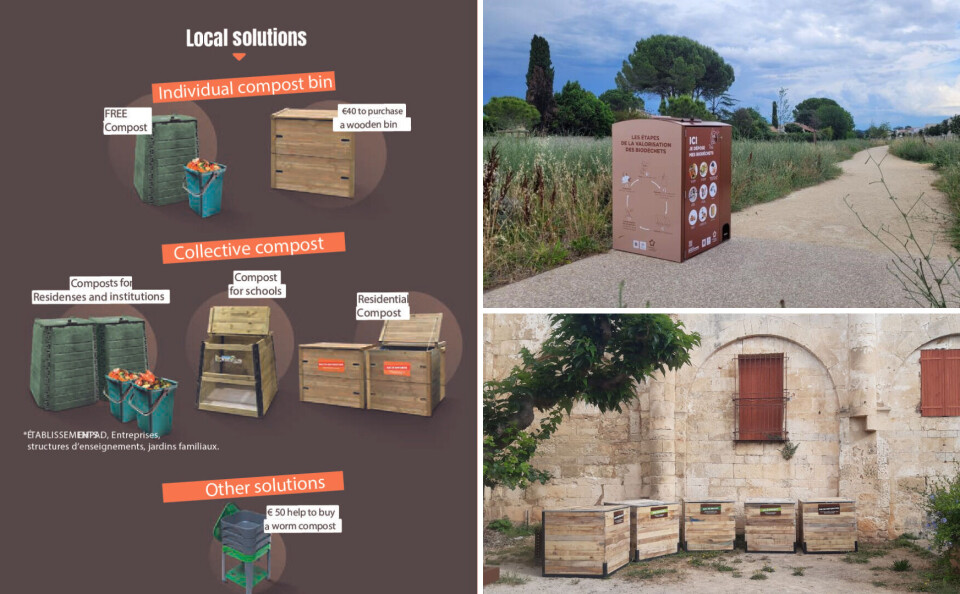-
Pistes closed, confinement orders: Alpine resorts deal with avalanche risk
Increased snowfall this weekend may cause further closures as busy school holiday season continues
-
Former French Interior Minister announces 2027 presidential candidacy
Bruno Retailleau recently asked prefectures to be tough on immigration
-
From Oregon to Brittany: primrose nursery in France celebrates 90th anniversary
Barnhaven Primroses traces its history back to 1930s America
Are you (and your council) ready for obligatory compost law in France?
Different areas have different policies - we take a tour of some

All food and garden waste in France must not be put into the usual bins from January 1, 2024 - and local authorities have to provide a solution for local residents to dispose of it.
People will have to put this waste into a separate container, which can then either be tipped into a private or shared compost, or collected by the local authority.
We look at what solutions different local authorities have planned.
For many people, particularly those living in apartments, a private compost heap is wholly impractical, and the new waste sorting rules may require them to travel several kilometres with their food and garden waste.
However, these new rules impose obligations on local authorities as much as individuals.
While some local authorities have already been proposing solutions for biowaste collection for several years, others are scrambling to offer a solution for January 2024.
Nantes, Grenoble, Rennes, Lyon and Montpellier appear to be more prepared than many other areas.
Read more: Explainer: the rules about composting from January 1 in France
What are local authorities planning for biowaste collection?
Paris has been experimenting with biowaste collection since 2017, proposing local collection in the 2e and 12e arrondissements.
Under this experiment, the Métropole provides 36 disposable bags (called Mon p'tit sac) available every six months through its partner Novamont, along with a seven litre bucket (called Mon p'tit bac) to store biowaste.
Inhabitants must then put the waste in brown waste bins, which are usually next to the yellow recycling bins.
The Paris Métropole has also introduced biowaste collection points in numerous markets around the city.
It hopes to make the Mon p'tit sac and Mon p'tit bac solution for biowaste widely available in 2024.
Montpellier Métropole told The Connexion that it is taking a long view of the new law and “not simply putting out composting bins for the sake of it”. “We want to encourage people to find a solution that suits their needs.”
The city has experimented with biowaste collection since 2008, with various projects, including a door-to-door collection experiment that ran until July 2023.
It says that several types of voluntary biowaste collection points are already available in various communes of the Métropole, including municipal collection, community led schemes and individual solutions.
One such solution is the Métropole’s €50 offer towards the purchase of a worm compost bin, suitable for use in apartments.
It says that many inhabitants will be sent a bucket and 36 brown paper bags, along with an instruction booklet for January 1. However, the roll-out of the biowaste collection scheme will happen over two to three ears.
Nantes told Ouest France that “it will be ready” for January 1, 2024. The city already has around 400 collective compost bins, which are managed by the Compostri association.
Bordeaux has already provided 2,000 biowaste collection points around the city. However, Vice-President of Bordeaux Métropole Patrick Labesse, admitted to Sud Ouest that the installation of compost bins and collection points in urban areas “is a complicated matter”.
Nice told The Connexion that collective compost bins are already available in public parks, however, the mairie did not say if this system would be extended for January 1.
What are rural areas planning for biowaste collection?
Rural communes with fewer means at their disposal face more of a struggle to adapt to the new law.
Saint-Lô, in Normandy, told The Connexion that the management of biowaste will depend on whether people live in rural areas of the commune or in the town centre.
The 85% of the commune’s population living outside of the town centre will be expected to manage their own composting needs without any specific organised biowaste collection.
In the town centre, it says there are several associations managing collection initiatives, although no municipal collection scheme is envisaged for the time being, except for that of companies (including restaurants), which must pay for biowaste collection from January 3, 2024.
However, the Saint-Lô mairie can provide inhabitants with €20 towards the purchase of a compost bin or a worm compost bin.
The mayor of a rural commune in the Cévennes in the Gard told The Connexion that compost bins should appear next to the yellow recycling bins in January, but conceded that this will happen “little by little”.
Indeed, the local agglomeration admitted that “the bins have not been ordered yet”.
Many communes and agglomerations, both large cities and (including Bordeaux) and small communes already provide compost boxes in exchange for a deposit, usually of €20.
Montpellier Métropole says it provides these composting boxes for free on request. It has already distributed 35,000.
Contact your local mairie to see if it can provide this service.
As January 1, 2024 approaches, mairies and local authorities will send letters to local residents to inform them about the new food and garden waste sorting rules
Read more
Most homes in France not ready to separate food waste come January 1
Do not be fooled by ‘compostable’ plastic, says French consumer group
























